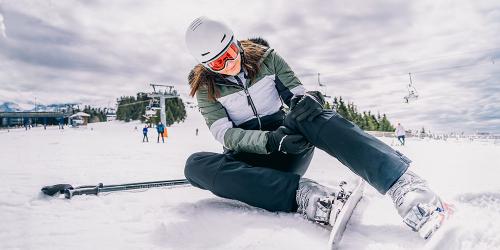Winter in Canada provides opportunities for plenty of thrilling outdoor activities, including skiing, snowboarding, snowmobiling, fat biking, and pond hockey. For outdoor enthusiasts, there is much to enjoy. But many of these activities also involve a degree of risk, and injuries are unfortunately not uncommon. If you or a family member gets injured during winter activities, is it possible to seek compensation?
The answer is: sometimes. There are a number of factors influencing whether someone else may be liable for your injuries, including legislation, any waivers you may have signed, and the specific circumstances surrounding your accident. An experienced personal injury lawyer can assist you in evaluating how those factors may operate in your situation.
Liability of Resort Operators
Companies who operate outdoor resorts have a duty to take reasonable care to see that all guests on their premises are reasonably safe in using the facility for the purposes for which they are permitted to be there. The most common example is a ski hill, although similar rules could apply to skating rinks, cross-country ski centres, fat bike trails, or other comparable facilities.
The resort operator’s duty of care includes a responsibility to ensure that equipment is functioning properly, that trails and terrain are properly marked, maintained and free of hazards, and that staff are properly trained to provide a safe visitor experience.
However, Alberta’s Occupiers’ Liability Act, which applies to resort operators, states that liability “may be extended, restricted, modified or excluded by express agreement or express notice.” This means that resort operators can seek to limit the scope of their liability for accidents. They typically do this by having patrons sign waivers, printing them on the patron’s ticket, and/or posting signage around the property.
The Act provides that a waiver is not effective to limit liability “unless reasonable steps were taken to bring it to the attention of the visitor.” The question of whether reasonable steps were taken is a finding of fact in each case. The fact that the patron did not read the waiver may or may not be sufficient for the Court to find the waiver does not apply depending on the circumstances.
A resort operator’s duty of care also does not apply to risks that patrons have willingly accepted. The waiver may be used to alert patrons to the risks inherent in skiing, and most ski hills also post warning signs around the property. However, signage that is posted in locations that the patron will not see until after purchasing the lift ticket likely cannot be relied on by the ski hill to argue that the patron had “reasonable notice” of the risks.
This rule was applied, for example, in Apps v. Grouse Mountain Resorts Ltd, 2020 BCCA 78, where the plaintiff was seriously injured by a fall in the snowboard park. The court held that only the steps taken by the ski hill before and at the time of the issuance of the ticket could be taken into account in assessing whether it gave the plaintiff reasonable notice of the terms of its waiver. Signs posted in the snowboard park itself, which the plaintiff would not have seen until after purchasing the ticket, could not be said to provide the plaintiff with reasonable notice.
In addition, a waiver may not be effective to protect a resort operator from liability for its own negligence. This will depend on the wording of the waiver. Acceptance of the risks inherent in the activity of skiing, for example, might not include acceptance of risks arising from malfunctioning lift equipment or poorly groomed terrain. Therefore, it is important to look at what was actually stated in the waiver. In general, the more broadly worded the waiver, the greater the burden on the resort operator to bring it to the patron’s attention.
Tour Operators
Companies who organize outdoor tours, such as back-country or heli-skiing tours, are also responsible to take reasonable care for the safety of patrons participating in their tours. This includes ensuring that guides and other staff are properly trained and certified, and that any equipment provided is in good working order. In addition, depending on the activity, certain precautions related to assessment of environmental conditions (e.g., risk of avalanche) or the skill level of patrons may be part of the standard of care.
Like resort operators, tour companies commonly require participants to sign waivers and statements acknowledging the risks of the activities they are about to participate in. Once again, the effectiveness of these contractual provisions will depend on whether, in the circumstances, it can be said that the patron was given reasonable notice of the waiver, or that the risks that materialized were among those that the patron willingly accepted.
Injuries Caused by Other Participants
It is also possible that a third party participating in the same outdoor activity as you or using the same facility could have some responsibility for your injuries. For example, if an accident is caused by another skier who crashed into you, or someone who otherwise behaved recklessly or dangerously, that individual may be found negligent, and may bear some liability.
In relation to ski accidents, standards of behaviour may be assessed based on the Alpine Responsibility Code or the Cross-country Responsibility Code. Both codes are endorsed by the Canada West Ski Areas Association and provide guidelines for safe behaviour at ski facilities.
Reckless or dangerous conduct can lead to liability in other types of winter activities as well. For example, in Casterton v. MacIsaac, 2020 ONSC 190, Casterton suffered a concussion, broken teeth, and cuts to his face and the inside of his mouth following a collision with MacIsaac, who was an opposing player during a recreational hockey game. The court found that while players accepted the risk that they might be accidentally injured during normal game play, a player does not accept the risk of injury from conduct that is malicious, out of the ordinary or beyond the bounds of fair play. MacIsaac’s action in skating at Casterton at high speed to deliver a blindside hit to the face created a more than ordinary risk of injury and was either deliberate or reckless. MacIsaac was held liable for Casterton’s injuries.
Snowmobile Accidents
Operators of snowmobiles are liable for the negligent operation of their vehicle if it results in injury to passengers and others. In a previous blog post (Can I recover damages for snowmobiling injuries), we discussed cases illustrating situations where individuals injured in snowmobile accidents were able to claim compensation from a third party who caused or contributed to their accident.
It is important to be aware that snowmobiling on public land in Alberta is governed by the Traffic Safety Act, which provides particular rules that guide safe operation, and which may also play a role in in determining liability in the event of an accident. Among other things:
- A snowmobile must be registered and insured ($200,000 in public liability and property damage insurance);
- A person operating the snowmobile must have a valid class 5 driver’s licence;
- Helmets must be worn by the driver and passenger at all times;
- Persons under 14 years of age are prohibited from driving a snowmobile unless supervised by an adult of at least 18 years of age.
The Public Lands Act stipulates that anyone accessing public land for a recreational purpose, whether with or without permission, is deemed to have willingly assumed all risks related to the recreational purpose for which the land was accessed.
An exception exists, however, for “risks created by the wilful or reckless conduct of the owner or occupier of the public land.” If an accident results from a hazard found on the land, the Crown may be liable for your injuries under the Occupier’s Liability Act. Similarly, anyone occupying the land under agreement with the Crown – for example, someone holding a grazing or timber licence, or a utility company who installs infrastructure on the land – could also be liable if they have cause or contributed to the creation of a hazard.
What if You Injure Someone?
All participants in winter recreational activities are responsible to make sure they do so in a safe manner. If an accident occurs, it is not uncommon that the parties involved may disagree about who is at fault.
If you find yourself in a situation where liability is being alleged against you, it may be helpful to know that some homeowner’s insurance policies include liability insurance that provides coverage for accidents occurring on your property, but also for accidents off the property. The availability of coverage depends on the terms of your policy. A review of your policy, or a call to your insurance broker, may help you determine whether you have coverage.
Taking Care for Your Own Safety
Regardless of what winter activity you choose to participate in, it is always important to be conscious that you have a responsibility to take steps to ensure a safe and fun experience, both for yourself and for other participants. This includes recognizing the limits of your skill level, having the right equipment, and following rules that govern the activity.
If you or a loved one suffers an injury during a winter recreational activity, our team of experienced personal injury lawyers can help you to assess the possibility of making a damages claim. Contact us for a free, no obligation, consultation.

